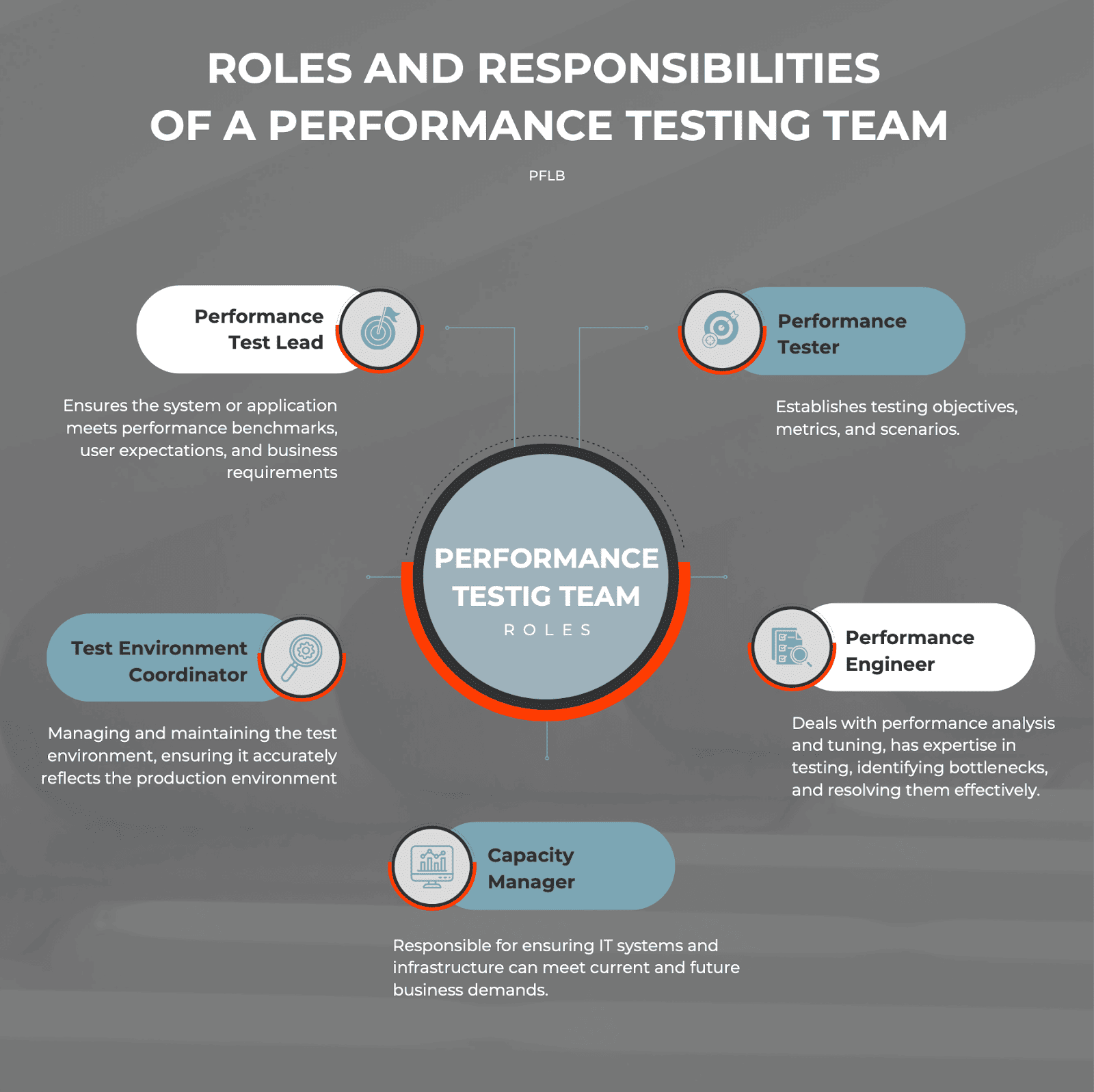Performance testing is a specialized discipline focused on assessing system performance metrics like speed and scalability. While it shares the goal of ensuring product quality, it should not be equated with the broader scope of quality assurance. In some organizations, the performance test team operates as part of the QA team, while in others, it functions independently, aligned with DevOps or SRE practices.
Performance testing is integrated into the development process and is conducted before product launch, scaling, and continuously after adding new features and updates. Software testing is a growing industry that offers a wide variety of tools for in-house teams and performance testing services for outsourcing.
Key Takeaways:
What Does the Performance Testing Team Do?
To grow, any digital project requires performance testing. This process ensures that a software system is reliable, efficient, and scalable enough to meet both the business’s and users’ needs. To achieve such results, a company needs a well-structured performance testing team.
Prevents Service Disruptions
Regular and timely performance testing by a certified team can uncover potential issues before they become costly problems, saving time and resources. It also helps prevent major losses caused by high loads, such as the $34 million Amazon lost in just one hour in 2021.
Enhances Customer Satisfaction
Performance testing helps ensure that applications respond quickly, directly contributing to a positive user experience, increasing engagement, and boosting interactivity. This is vital considering that 84% of customers are ready to pay more for better experiences.
Optimizes Scalability
The team assesses how well an application can scale with increased load, helping organizations plan for growth and manage resources efficiently.
Optimizes Costs
By identifying performance bottlenecks and issues early, the QA team reduces the cost of fixing issues in later development stages, allowing the company to optimize its infrastructure investments.
Meanwhile, if a business has an exact scaling plan and conducts regular performance testing, costs are significantly reduced.
You need performance testing if:
Performance Testing Team Roles and Responsibilities
Performance testing evaluates a product’s ability to meet non-functional requirements, such as speed, scalability, and reliability, under various conditions. This process typically involves defining goals and expectations, designing test scenarios, executing tests, analyzing results, and identifying performance bottlenecks. Roles and responsibilities for performance testing team are distinct from QA software testing roles, focusing exclusively on ensuring compliance with non-functional requirements rather than functional correctness.
Roles and responsibilities of a test lead include:
Key Responsibilities:
Performance analysis:
Performance tuning is aimed at achieving performance goals and eliminating bottlenecks:
The role is deeply integrated with key ITSM processes, such as Change Management, Release Management, and Incident Management, to proactively verify that systems have sufficient capacity to handle upcoming changes or events. Capacity Managers also collaborate closely with the performance testing team, leveraging their insights to track capacity changes and address potential bottlenecks proactively. This ensures the seamless operation of systems and supports the organization’s scalability and reliability goals.
Key Skills For Performance Testing Team Members
Performance Tester
A successful Performance Tester needs a mix of technical expertise, problem-solving, and collaboration skills. Here are the essentials:
Technical Skills
Analytical Skills
Soft Skills
Performance Test Lead
Performance Test Environment Coordinator
Tips to Enhance Performance Testing Team
The efficiency and profits of a platform are powered by strong performance testing. So, to maximize the positive outcomes, a strong team is a must. To make the most of it, explore the following tips.
Hire Consciously
When hiring, outline the structure of a team, plan its budget, and define its pains. To describe positions and performance testing skills required, you should clearly understand what testing types you will need in the future.
Next, be eager to devote enough time to search for skillful, experienced, and available professionals. They tend to be sought-after. Don’t hire the first specialist you see: instead, conduct detailed scoring, require confirmed cases, and, most importantly, ask a relevant talent to bring their professional network to your business. It can save your time and grant better, more polished results.
Pay Enough Attention to the Organizational Structure
If you already have a software testing team to enhance, pay attention to its organizational structure and divide it into sectors, including social, technical, analytical, etc. To define the importance of this approach, consider a transparent example. When performance test engineer roles and responsibilities are not considered, and specialists have to take over communicational aspects, they can’t focus on their work adequately. Thus, more issues and bugs may go unnoticed.
Give Feedback
You can directly influence the performance of your team. For this, speak with its members, defining your requirements, standards, and expectations. Monitor their progress, persuade them to visit conferences and courses, and motivate them to reduce human errors.
Keep Planning
Make sure the performance testing team works in sprints. Short but efficient periods marked by the same goal are more applicable to this field, and they enable more accurate reports.
Use Reliable Performance Testing Tools
If the performance testing team has a list of repetitive tasks, testing tools can automate them, saving time and resources. AI-powered tools enhance detailed reporting, help manage required environments, and reduce costs on performance testing.
Use Software Testing Services
If hiring and polishing a relevant performance testing team is not your cup of tea, or you want to optimize processes without business risks, your potentially best solution is outsourcing. Relevant for cases where the need for PT is not constant, this approach helps you gain the expertise, quality, and speed of an already structured team and save money to invest it in other vital aspects, such as marketing.
Challenges of Performance Testing Team
1. Lack of Skills
Performance testing is often assigned to QA engineers who lack specialized expertise in this area. This is a significant mistake, as performance testing requires entirely different skills and knowledge. Misassigning the role can lead to a complete failure of the performance testing process.
2. Neglecting Load Testing Methodology and Profiles
One common challenge is insufficient attention to the load testing methodology and load profile, especially for new systems without usage statistics. This oversight results in invalid testing outcomes. Developing an effective methodology requires an experienced performance testing lead and close collaboration with system analysts.
3. Invalid Test Environment or Risky Production Testing
Conducting performance testing without a valid test environment—or worse, testing directly on production systems—is a major risk. Reliable load testing results demand a valid test bench. While a production replica isn’t always necessary, the environment must accurately reflect key performance conditions.
PFLB Software Testing Service
PFLB helps businesses across industries, from finance to healthcare, worldwide—each with a successful story to share. With a personalized approach to each case, our solutions are tailored to both large-scale banks and startups. To learn more, explore our case studies.
PFLB offers customers subscriptions for regular script updates and test runs to maximize cost efficiency. Cost savings come from higher volume, a more streamlined approach to resources, and the expertise of dedicated professionals.
Conclusion
Performance testing ensures that applications are scalable, reliable, and efficient across various industries. A well-organized performance testing team, with clear QA team roles and responsibilities such as test engineers, leads, and environment coordinators, plays a key role in identifying and addressing potential issues before they impact users or business operations.
Explore our performance testing services and find the ones you need.





